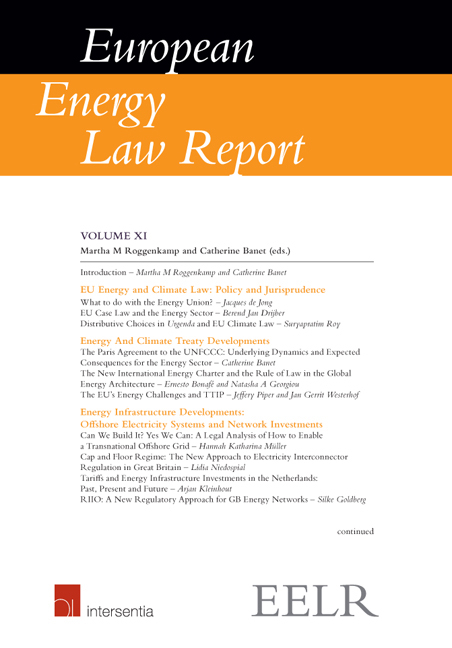Book contents
- Frontmatter
- Editorial
- Contents
- List of Abbreviations
- List of Contributors
- Introduction
- Part I EU Energy and Climate Law: Policy and Jurisprudence
- Part II Energy and Climate Treaty Developments
- Part III Energy Infrastructure Developments: Offshore Electricity Systems and Network Investments
- Part IV Heat Supply Legislation in the Eu
- Chapter XI District Heating Regulation in Sweden
- Chapter XII Heat Supply in Denmark: Any Lessons to Be Learned?
- Chapter XIII The Heat is On: Developments in the Regulation of the Heat Market in the Netherlands
- Part V Security of Energy Supply and Safety
Chapter XIII - The Heat is On: Developments in the Regulation of the Heat Market in the Netherlands
from Part IV - Heat Supply Legislation in the Eu
Published online by Cambridge University Press: 29 September 2018
- Frontmatter
- Editorial
- Contents
- List of Abbreviations
- List of Contributors
- Introduction
- Part I EU Energy and Climate Law: Policy and Jurisprudence
- Part II Energy and Climate Treaty Developments
- Part III Energy Infrastructure Developments: Offshore Electricity Systems and Network Investments
- Part IV Heat Supply Legislation in the Eu
- Chapter XI District Heating Regulation in Sweden
- Chapter XII Heat Supply in Denmark: Any Lessons to Be Learned?
- Chapter XIII The Heat is On: Developments in the Regulation of the Heat Market in the Netherlands
- Part V Security of Energy Supply and Safety
Summary
INTRODUCTION
In the Netherlands heat has long been lagging behind electricity and gas in various respects. This is partly due to its local nature, a lack of harmonizing European legislation and the limited scale of heat in the Netherlands. The energy liberalization process has nevertheless also had an impact on the heat supply sector. It led to a lengthy discussion on the need for a specific national legal framework, which started in 2003 and finally resulted in the adoption of a Heat Act in 2014. However, the entry into force of this law did not have the positive impact that was expected and led to discussions about the need for amendments. Another trigger for such discussions was the need for a transition away from fossil fuels and towards renewable and more efficient forms of energy supply. This need originated from climate objectives but also from the desire to gradually phase out gas production from the Groningen gas field in the Netherlands.
This chapter begins with a brief history on the current Heat Act and an overview of the Dutch heat market. Then some of the practical problems with the current Heat Act are discussed, followed by suggestions for possible solutions and some recent developments.
THE HEAT ACT
Following the liberalization of the energy market that started in the 1990s, a first draft of today's Heat Act was presented by two members of the Dutch Parliament in 2003. Their main aims were to protect consumers of heat from high costs and to provide security of supply. The Heat Act was completed in 2008 and passed both houses of Parliament during the period July 2008 to February 2009. The bill envisaged a system of tariff regulation consisting of two elements, namely a reasonable price and a maximum price. Whereas the terms and conditions for determining the reasonable price were to be included in policy rules adopted by the supervisory authority, the regime regulating the maximum price was to be presented in a governmental decree, in accordance with the so-called ‘No More Than Otherwise’ principle (Niet Meer Dan Anders principe, hereafter: ‘NMDA principle’), as will be explained below.
However, the Heat Act did not come into force in 2009 because the Minister of Economic Affairs (the ‘Minister ’), together with the lower house of Parliament, found amendments to be necessary.
- Type
- Chapter
- Information
- European Energy Law Report XI , pp. 257 - 278Publisher: IntersentiaPrint publication year: 2017



